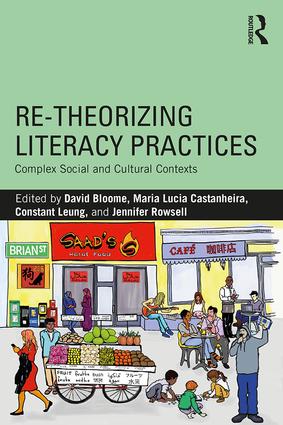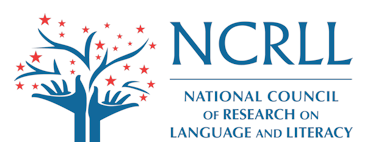Meditations, Theories and Questions:
David Bloome, Distinguished NCRLL Scholar
This post was written by member Catherine Compton-Lilly.
 Our annual business meeting at LRA was anything but business as usual. Dave Bloome, one of our 2018 NCRLL Distinguished Scholars, shared his thoughts and the inspiration for an important book, just published by Routledge, Re-Theorizing Literacy Practices: Complex Social and Cultural Contexts (Bloome, Castanheira, Leung, & Rowsell, 2018). The book is a testament to the work of Brian Street; the final chapter is a piece that Street was working on prior to his death. As you probably know, Brian Street was a professor of language and literacy at Kings College London. Sadly, we lost Brian Street in June of 2017. While “re-theorizing” suggests that we rethink what we have come to understand, this text is decidedly directed at the future. Thus, the book is not only about our field, but also about us as scholars and humans; people who engage with ideas and with each other.
Our annual business meeting at LRA was anything but business as usual. Dave Bloome, one of our 2018 NCRLL Distinguished Scholars, shared his thoughts and the inspiration for an important book, just published by Routledge, Re-Theorizing Literacy Practices: Complex Social and Cultural Contexts (Bloome, Castanheira, Leung, & Rowsell, 2018). The book is a testament to the work of Brian Street; the final chapter is a piece that Street was working on prior to his death. As you probably know, Brian Street was a professor of language and literacy at Kings College London. Sadly, we lost Brian Street in June of 2017. While “re-theorizing” suggests that we rethink what we have come to understand, this text is decidedly directed at the future. Thus, the book is not only about our field, but also about us as scholars and humans; people who engage with ideas and with each other.

If you know Dave Bloome, you know that hearing him speak is never disappointing. Both the book and Dave Bloome’s talk invoked a jazz metaphor. Brian Street was a serious jazz fan. One of his favorite pieces was a Duke Ellington tune entitled “Lost in Meditation”. Aptly, Dave Bloome’s talk invited us on a collective and meditative journey. Like a good jazz album, Dave’s words evoked rumination, wondering, and challenges to accepted ideas. Specifically, he asked questions – hard questions – about literacy practices, spaces for literacy, purposes for literacy, and relations between literacy practices and power. He asked about intertextual relationships, silence and erasure, and how literacy practices evolve and metamorphize – sometimes in unexpected ways – across time and space.
These questions trouble the core of our work as literacy scholars. The send us back to examining our assumed purposes and effects, challenging us to reconsider and reject assumed ways of being. Like jazz improvisation, there is no right note and no perfect response, only conversation and interaction within assemblages of sound, silence, and sensation. As researchers, we can trust our instincts, challenge traditional limits, and break established rules, but we must remain in harmony with the music, its harmonies, rhythms, and collective intentions. This is the challenge Dr. Bloome placed before us. How do we as a field, honor where we have been while seeking new melodies and harmonies? How do we envision possibilities beyond what we know and have been trained to do? How can we invite new voices, new timbres, and new rhythms that extend what we know and do?
Dave’s questions were decidedly academic:
- How might the boundaries of what defines literacy events and practices be theorized?
- How are literacy practices implicated in power relations?
- How do silence, erasure and the unspeakable contribute to the constitution of literacy practices?
- Who is using written language, and the teaching of the uses of written language, to do what to whom?
- What do we mean by power?
- Are intertextual, intercontextual, and historical connections given or constructed, by whom and how?
- How are literacy practices responsive to changes over extended periods of time?
Dave’s questions raise important considerations, prod at our fundamental beliefs, and ask us to rethink, reconsider, and re-visit what we thought we knew. Bloome’s talk and the book – Re-Theorizing Literacy Practices – explain why New Literacy Studies are still new, still alive, and still offering new possibilities. As Dave explained, these questions reveal important insights about “who we all are together” and ultimately, “what it means to be human among humans”.
Bloome, D., Castanheira, M. L., Leung, C., & Rowsell, J. (Eds.). (2018). Re-theorizing literacy practices: Complex social and cultural contexts. New York, NY: Routledge.
David Bloome (The Ohio State University) along with Patricia Edwards (Michigan State University) and Peter Smagorinsky (Georgia State University) are the 2018 NCRLL Distinguished Scholars.

Catherine Compton-Lilly is the John C. Hungerpiller Professor at the University of South Carolina. Among the books she has edited or authored are: Reading Families: The Literate Lives of Urban Children (2003), Rereading Families (2007), Reading Time: The literate lives of urban secondary students and their families (2012), and Reading students’ lives: Literacy learning across time (2016).
Designed by Elegant Themes | Powered by WordPress


